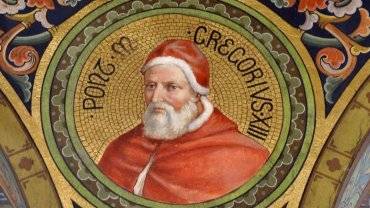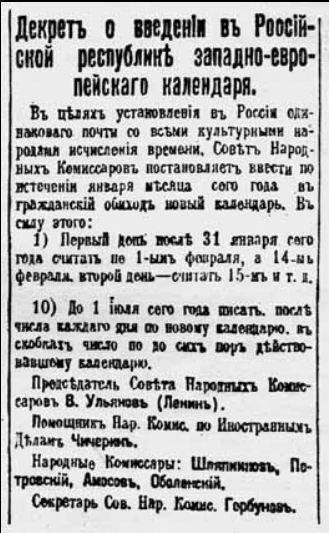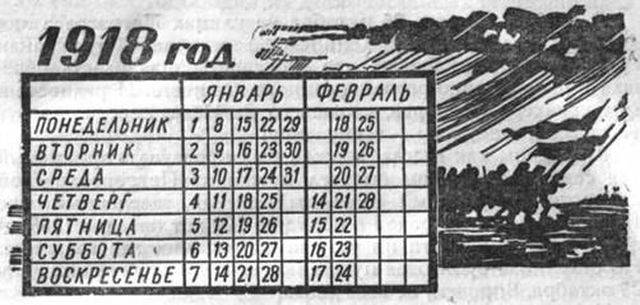One hundred years ago, Russia switched to a new calendar.
As is known, until the 1918, the Julian calendar was used in the Russian Empire. This was due primarily to the religious tradition: in the Russian Empire, Orthodoxy was the state religion. The Julian calendar was adopted in the Roman Empire by Julius Caesar, after whom he received his name. Up to the late Middle Ages, the whole of Europe lived according to the Julian calendar, but in 1582, Pope Gregory XIII issued a decree on calendar reform. The main reason for the adoption of the new calendar was a shift in relation to the Julian calendar of the day of the vernal equinox. This circumstance created certain difficulties in calculating the date of Easter.

In October, 1582 switched to the Gregorian calendar the most conservative Catholic countries, where the Vatican enjoyed great influence - Spain, Portugal, the Polish-Lithuanian Commonwealth and the states of Italy. In December, the Gregorian calendar adopted France's 1582, and in 1583, Austria, Bavaria, Flanders, Holland, and a number of German lands. In many other European countries, the transition was carried out gradually. First of all, the protestant states of Europe objected to the Gregorian calendar, for which the refusal to use the calendar introduced by the Pope was of fundamental importance. But still, even they could not evade calendar reform. So, in the UK, the Gregorian calendar was adopted only in 1752 year. A year later, Sweden moved to the Gregorian calendar. Gradually, Asian countries also switched to the Gregorian calendar, for example, in 1873, it was introduced in Japan, in 1911 - in China (later, China again abandoned the Gregorian calendar, and then returned to it again).
It should be noted that in many countries the transition to the Gregorian calendar was not painless. For example, in England, which switched to the new calendar in 1752, even there were riots of people dissatisfied with the changes that occurred. In Russia, on the contrary, in the 1700 year, Peter I, pursuing a policy of modernization, introduced the Julian calendar. Obviously, with all his striving for cardinal reforming of social and cultural life, Peter was not ready to go against the Orthodox Church, which was very negative about the transition to the Gregorian calendar. In the Russian Empire, the transition to the Gregorian calendar was never implemented. This entailed numerous difficulties in economic, cultural and political relations with Europe, but the church insisted on maintaining the Julian calendar, and the Russian monarchs did not object to its position.
In the first half of the XIX century, the advocates of modernization began talking about the desirability of switching to the Gregorian calendar, especially since by this time the Protestant countries of Europe, including Great Britain, had switched to it. However, the Minister of Public Education, General Karl Lieven, opposed the calendar reform. He was, of course, supported by the Orthodox Church. When, in the second half of the XIX century, Dmitri Mendeleev spoke about the need to move to a new calendar, representatives of the Holy Synod quickly stopped him, saying that the time had not yet come for such a large-scale reform. The church did not see any reasons for abandoning the Julian calendar, because, firstly, it was used in the Orthodox tradition for many centuries, and secondly, if it were transferred to the Gregorian calendar, the Divine Service Charter would inevitably be violated, since the date of the celebration of Holy Easter is calculated by special lunar-solar calendar, which is also closely associated with the Julian calendar.
The February 1917 revolution of the year, which overthrew the monarchy in Russia, was the impetus for the most diverse large-scale changes in the life of the country. It was during the period when the country was governed by the Provisional Government that the development of a draft calendar reform began. Its authors believed that there was a need to switch to the Gregorian calendar, since double writing of dates in official documents and letters was used so long ago, especially if they were devoted to events in other states or were sent to addressees who lived in other countries. However, in the period from February to October 1917, it was not possible to carry out calendar reform in the country — the Provisional Government was not up to that.
The October Revolution 1917 of the Year finally brought Russia to the calendar change. Of course, the atheists - the Bolsheviks did not care about the religious contradictions between the Orthodox and the Catholic churches, they did not even think about stories create the Gregorian calendar. But since “all advanced mankind,” as the Bolsheviks liked to say, by that time had passed to the Gregorian calendar, Russia was also wanted to be modernized. If you renounce the old world - in everything, including in the calendar. Therefore, the question of calendar reform was very interested in the Bolsheviks. This is confirmed at least by the fact that already 16 (29) in November 1917, at one of the very first meetings of the Council of People's Commissars of the RSFSR, the question was raised about the need to switch to the Gregorian calendar.
 A certain role was played by the "secular" character of the Gregorian calendar. Although the calendar itself was introduced in Europe at the initiative of the Pope, the Russian Orthodox Church did not intend to switch to the Gregorian calendar. January 23 (February 5) The Orthodox Church of 1918 was separated from the state, which finally untied the hands of the new government on the issue of delimiting the secular and church calendars. The Bolsheviks decided to strike another blow to the positions of the Orthodox Church, abandoning the Julian calendar. At the same meeting, the Council of People's Commissars, at which the church was separated from the state, created a special commission for the transition to the new calendar. She presented two possible scenarios. The first option assumed a mild and gradual transition to a new calendar - discarding 24 hours each year. In this case, the implementation of calendar reform would have taken 13 years, and most importantly, it would have completely satisfied the Russian Orthodox Church. But Vladimir Lenin was inclined towards a more radical variant, which envisioned a momentary and quick transition to the Gregorian calendar.
A certain role was played by the "secular" character of the Gregorian calendar. Although the calendar itself was introduced in Europe at the initiative of the Pope, the Russian Orthodox Church did not intend to switch to the Gregorian calendar. January 23 (February 5) The Orthodox Church of 1918 was separated from the state, which finally untied the hands of the new government on the issue of delimiting the secular and church calendars. The Bolsheviks decided to strike another blow to the positions of the Orthodox Church, abandoning the Julian calendar. At the same meeting, the Council of People's Commissars, at which the church was separated from the state, created a special commission for the transition to the new calendar. She presented two possible scenarios. The first option assumed a mild and gradual transition to a new calendar - discarding 24 hours each year. In this case, the implementation of calendar reform would have taken 13 years, and most importantly, it would have completely satisfied the Russian Orthodox Church. But Vladimir Lenin was inclined towards a more radical variant, which envisioned a momentary and quick transition to the Gregorian calendar. 24 January (6 February) 1918 of the Council of People’s Commissars of the RSFSR adopted a decree introducing the Western European calendar in the Russian Republic, and two days later, on January 26 (8 of February) 1918, the decree was signed by Chairman of the Council of People’s Commissars of the RSFSR Vladimir Lenin. In addition to Lenin, Georgiy Chicherin, Assistant to the People’s Commissar for Foreign Affairs, Alexander Shlyapnikov, People’s Commissar of Labor, Grigory Petrovsky, People’s Commissar of Internal Affairs of the RSFSR, Chairman of the RSFSR Supreme Council of the National Economy, signed the document. The reason for the transition to the new calendar was the need to establish in Russia the calculation of time, the same "with almost all cultural nations."
Enter the new calendar decided after the expiration of January 1918. For this purpose, the Council of People's Commissars decided to consider the first day after 31 in January 1918 of the year not February 1, but February 14 of the year 1918. The decree also emphasized that all obligations under contracts and laws that occurred between February 1 and February 14 were transferred to the period from February 14 to February 27 by adding to the deadline for meeting the obligations of thirteen days. With the addition of thirteen days, all obligations from February 14 to 1 1918 were counted, and obligations coming from 1 July 1918 were considered as coming according to the numbers of the new Gregorian calendar. Also, the decree regulated the payment of salaries and wages to citizens of the republic. Before 1 July 1918, it was necessary to indicate in brackets the number in the old calendar according to the old calendar, and from 1 in July 1918, only the number on the Gregorian calendar.

The decision to move the country to the Gregorian calendar inevitably caused controversy among the clergy and theologians. Already at the end of January 1918, the calendar reform became the subject of discussion of the All-Russian Local Council. There was a curious discussion on this discussion. Professor Ivan Alekseevich Karabinov stated that the Old Believers and other autocephalous churches would not agree with the proposal to switch to the Gregorian calendar and will continue to celebrate church holidays according to the old calendar. This circumstance, in turn, will violate the unity of the Orthodox churches. Another speaker, Professor Ivan Ivanovich Sokolov, agreed with this position, who also drew attention to the lack of the right of the Russian Orthodox Church to decide the calendar reform independently, without coordinating its actions with other autocephalous churches. A member of the Petrograd Press Committee, a layman, Mitrofan Alekseevich Semenov, in turn, suggested not to respond to the Bolshevik decrees at all, thus avoiding the need to switch to a new calendar.
Sergey Sergeevich Glagolev, a professor at the Moscow Theological Academy and a member of the Local Council of the Orthodox Russian Church from higher religious schools, emphasized that in the changed conditions, the church is unlikely to remain on the old calendar, as it increasingly disagrees with the sky, but it’s not worth taking hasty steps time to stay on the old, julian calendar. Moreover, Glagolev noted in his report, such a serious question can be solved only with the consent of all autocephalous Orthodox churches.
Ultimately, the department of worship and the department of the legal status of the Church in the state decided throughout the year 1918 to be guided by the old style. 15 March The 1918 Department of Divine Services, Preaching and the Church of the Russian Orthodox Church decided that, from the church-canonical point of view, it is not possible to resolve the calendar reform issue without coordination with all autocephalous churches. Therefore, it was decided to leave the Russian Orthodox Church on the Julian calendar.
In the 1923 year, when the Soviet Union had been living under a new calendar for five years, the church once again raised the issue of calendar reform. The second Local Council was held in Moscow. Metropolitan Antonin declared that the church and believers can switch to the Gregorian calendar quickly and painlessly, and there is nothing sinful in the transition itself, moreover, the calendar reform is necessary for the church. As a result, the Local Council adopted a resolution proclaiming the transition of the church to the Gregorian calendar from 12 June 1923. Interestingly, the resolution did not evoke the debate, which indicated the complete readiness of the participants in the council to switch to a new style.
Patriarch Tikhon, in connection with the current situation in the autumn of 1923, published his Message in which he condemned the decision of the Second Local Council as too hasty, but stressed the possibility of the transition of the church to the Gregorian calendar. Officially, it was planned to transfer the Russian Orthodox Church to the Gregorian calculus from October 2 1923, but on November 8, November 1923, Patriarch Tikhon refused this idea. Interestingly, in the 1924-1929 release calendars, church holidays were celebrated as if the transition to the Gregorian calendar did occur. For example, Christmas was celebrated on December 25 and 26. Again, the church raised the issue of switching to the Gregorian calendar in 1948, but it was never resolved positively. Despite the active pro-government lobby, most church hierarchs did not want to become “separatists” and accept the Gregorian calendar without coordination with other autocephalous churches.
Of course, Soviet Russia was not the last country to switch to the Gregorian calendar. In 1919, the Gregorian calendar was introduced by Romania and Yugoslavia, in 1924, by Greece. In 1926, Turkey moved to the Gregorian calendar with certain features, in 1928, Egypt. Currently, the Julian calendar continues to live in Ethiopia - one of the oldest Christian states in the world. In addition, the Russian, Georgian, Serbian, Jerusalem, Polish Orthodox churches, the Bessarabian metropolis of the Romanian Orthodox Church, as well as the Ukrainian Greek-Catholic and Russian Greek-Catholic churches lead the calendar according to the Julian calendar. Interestingly, the Polish Orthodox Church returned to the Julian calendar only in 2014 year, before that, for a long time, calculating the time according to the new Julian calendar, which coincides with the Gregorian calendar.
Information